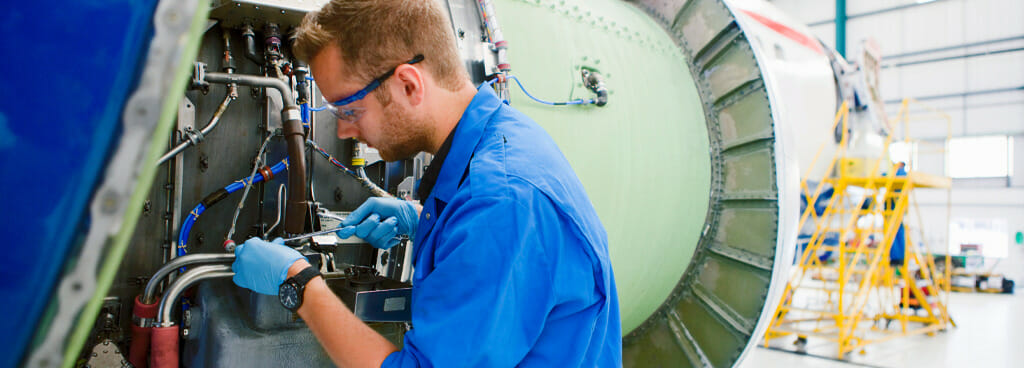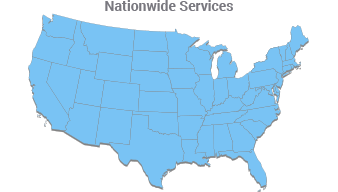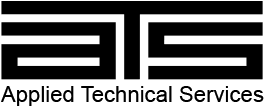- Home
- Services/IndustriesServicesindustries
- About Us
- LocationsStatesAccordion ContentAccordion ContentAccordion ContentAccordion Content
- Job Openings
- Quick Links
- ATS Family

Aircraft Engine Oil Analysis
Aircraft engine oil analysis reveals subtle indicators of a plane’s health. When clients submit oil samples to ATS, they can trust our qualified engineers and technicians to recognize potential issues that may jeopardize safe flight. Operating a certified FAA repair station for decades, ATS provides routine oil analysis and inspections to track issues such as:
- Wear
- Contamination
- Corrosion
- Overheating
- Leaking
- Fatigue
The FAA recommends periodic inspections of aircraft components to uncover flaws before they grow to critical size. Drawing on decades of experience, our engineers and technicians run multiple A2LA-accredited labs capable of analyzing oil samples and other aircraft components. Our experts can also evaluate an aircraft engine at a client’s location.
Uncovering Water and Corrosion
The ATS chemical analysis lab uses Karl Fischer testing to determine the water levels in engine oil and lubrication. Water may be present in an engine as a byproduct of combustion. When water mixes with chemicals, corrosion occurs, wearing away the components that lubricate and cool the engine. Over time, corrosion leaves the engine vulnerable to overheating, wear, and eventual failure. Our powerful equipment has a detection limit of 5ppm ±5 μg to identify slight traces of corrosion. We can give precise measurements in % moisture, parts per million (PPM), and micrograms (μg) of water.
Identifying Trace Metals and What They Mean
ATS can also perform analyses for trace metals uncovered during oil analysis. High levels of certain trace metals can indicate a specific issue with an engine component. For instance, a spike in iron levels may suggest rust or a problem in the cylinders or rotating shafts. To identify and assess the metals in an oil sample, our lab experts use inductively coupled plasma (ICP) testing, which can detect amounts as small as parts per billion (ppb) of metals such as:
- Aluminum
- Iron
- Copper
- Lead
- Nickel
Our clients frequently request ICP and metals analysis to identify contaminants, maintain performance quality, and comply with regulatory requirements for maintenance and inspections. We design our testing process according to ASTM E1479 and client specifications.
Nondestructive Aircraft Inspections
Engines are complex systems of working parts that require highly accurate assembly. To avoid the need for taking apart and reassembling an aircraft engine, our experts use nondestructive inspections that can reveal issues without damaging components, allowing planes to return to the skies sooner.
Trace metals and contaminants uncovered during oil analysis indicate which materials and components require inspection. After an oil analysis, our inspectors can perform a nondestructive inspection (NDI) targeting areas of concern. We can provide visual inspections using a borescope, a tiny camera for hard-to-access locations. Borescopes can uncover cracks, debris, and wear that result from overheating, vibration, fatigue, thermal cycling, and contamination.
Our super lab has achieved NADCAP accreditations to perform on-site and laboratory NDI services, namely Penetrant Testing and Magnetic Particle Testing.
Other Aircraft Services
Sometimes, the trends shown in oil analysis indicate a wider problem that impacts multiple systems. ATS’s experts can evaluate other aircraft components to meet airworthiness requirements:
About ATS
For over fifty years, ATS has empowered clients to make informed business decisions across many industries, such as aerospace, defense, oil and gas production, and aviation. Our foundational services include consulting engineering, calibrations, testing, and inspections delivered by qualified experts. With a focus on delivering high-quality customer service, accurate data, and reliable analysis, ATS is one of the leading NDI providers in North America. The expanding ATS Family of Companies now operates labs and offices nationwide, reaching clients more conveniently than ever.
To learn more about our accreditations and standards, click here.
Contact Us
Call +1 (888) 287-5227 or complete the request form on this page to schedule an aircraft oil analysis today.

Request Form
"*" indicates required fields
Complete List Of Aerospace Services
Nondestructive Testing
- 737-NG Wing Tank Inspection
- Aircraft and Aviation NDT
- Aircraft Eddy Current Inspection
- Aircraft Engine Inspection
- Aircraft Structural NDT
- Aircraft Ultrasonic Inspection
- Aircraft Wheel Inspection
- Aircraft Window Inspection
- Aviation NDT
- Borescope Inspection Aircraft Engine
- Helicopter Rotor Grip
- Nadcap NDT Testing
